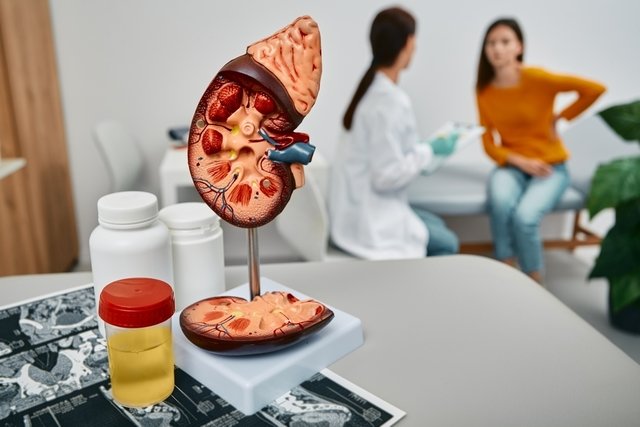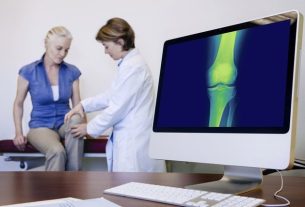Cystitis is an infection and inflammation of the bladder that can cause symptoms such as frequent urge to urinate but with little urine volume, a feeling of heaviness in the lower part of the belly and stinging or burning when urinating.
Cystitis is usually caused by Escherichia colia bacteria that is naturally present in the intestine and urinary tract, but which can multiply and migrate to the bladder.
In the presence of symptoms that may indicate cystitis, it is important to consult a urologist or gynecologist, in the case of women, so that appropriate treatment can be indicated, which generally includes the use of antibiotics and analgesics. See how cystitis is treated.

Main symptoms
The main symptoms of cystitis are:
- Pain in the lower abdomen or back;
- Frequent urge to urinate, but with little urine volume;
- Pain or burning when urinating;
- Feeling of heaviness in the lower abdomen;
- Pain when ejaculating, in men;
- Pain during sexual intercourse;
- Strong-smelling, dark or bloody urine;
- Low fever.
Pain in the lower back may also indicate that the infection has reached the kidneys and is causing pyelonephritis. In this case, other symptoms such as malaise, vomiting, chills and excessive sweating may also appear.
Read too: Pyelonephritis: what it is, symptoms, causes and treatment
Types of cystitis
The main types of this infection are acute and interstitial cystitis.
1. Acute cystitis
Acute cystitis is an infection and inflammation in the bladder that starts suddenly and gets worse quickly. In this type of infection, the person may experience pain when urinating and a frequent urge to urinate, but with little urine volume.
2. Interstitial cystitis
This type of cystitis is an inflammation of the walls of the bladder, which causes it to thicken and reduces its ability to store urine, causing pain during sexual intercourse, pain during ejaculation in men, and pain during menstruation in women. Learn more about interstitial cystitis.
How to confirm the diagnosis
To confirm the diagnosis, it is important to consult a urologist, or gynecologist, in the case of women, to evaluate the symptoms presented and the person’s health history. The doctor may also recommend tests, especially an EAS urine test and urine culture with an antibiogram, to identify the type of microorganism responsible for the infection.
If you want to assess your risk of cystitis, make an appointment with the urologist closest to you:
Taking care of your health has never been easier!
Possible causes
Possible causes of cystitis are:
- Sexual intercourse without the use of condoms;
- Alternate anal sex with vaginal sex, as it favors the migration of bacteria from the intestine to the vagina;
- Poor intimate hygiene, cleaning the anus from back to front;
- Low water intake, which increases urine concentration;
- Use of some medications, which alter immunity and favor the proliferation of microorganisms;
- Irritation caused by products, such as soaps and perfumes in the intimate area;
- Health conditions such as diabetes, kidney failure and kidney stones;
- Enlargement of the prostate in men;
- Vesicovaginal fistula, which is an abnormal connection between the bladder and the vagina.
The causes of cystitis are related to the migration of bacteria from the urinary tract or intestine to the bladder, making it a much more common condition in women than in men.
Cystitis in pregnancy
Cystitis during pregnancy may be more frequent because at this stage the woman has a natural impairment of the immune system, favoring the development of microorganisms and the occurrence of urinary infections. Cystitis during pregnancy causes the same symptoms as a urinary infection and treatment must be guided by a gynecologist.
How the treatment is carried out
The treatment of cystitis must be carried out by the doctor according to the type of bacteria and the symptoms presented by the person, and the use of antiseptics, such as cystex, and antibiotics such as ciprofloxacin or amoxicillin may be indicated, which should be used as indicated. doctor. Discover other remedies recommended for cystitis.
In addition to medications, it is also important to drink at least 2 liters of water per day and consume diuretic foods, such as watermelon, coconut water, pear and cucumber, for example.
Cystitis treatment can also be complemented with home remedies, such as a sitz bath with vinegar, dandelion tea and hibiscus tea. See other home remedies for cystitis.
Possible complications
When cystitis is not treated properly, bacteria can migrate from the bladder to the kidneys, causing pyelonephritis. Treatment for pyelonephritis must be started quickly to prevent bacteria from reaching the bloodstream and causing septicemia, which is a serious infection that can lead to death.
Other possible complications of cystitis include renal tract thrombosis, acute kidney failure and prostatitis, which is an inflammation of the prostate gland, causing symptoms such as pain, burning when urinating and fever. Learn more about prostatitis.
Bibliography
- NATIONAL KIDNEY FOUNDATION. nterstitial Cystitis. Available at: <https://www.kidney.org/atoz/content/interstitial>. Accessed on March 14, 2023
- TREASURE ISLAND (FL): STATPEARLS PUBLISHING. Cystitis. Available at: <https://www.ncbi.nlm.nih.gov/books/NBK482435/>. Accessed on March 14, 2023
- NATIONAL LIBRARY OF MEDICINE- MEDLINEPLUS. Cystitis – acute. Available at: <https://medlineplus.gov/ency/article/000526.htm>. Accessed on March 14, 2023

Sign up for our newsletter and stay up to date with exclusive news
that can transform your routine!
Warning: Undefined array key "title" in /home/storelat/public_html/wp-content/plugins/link-whisper-premium/templates/frontend/related-posts.php on line 12
Warning: Undefined array key "title_tag" in /home/storelat/public_html/wp-content/plugins/link-whisper-premium/templates/frontend/related-posts.php on line 13




